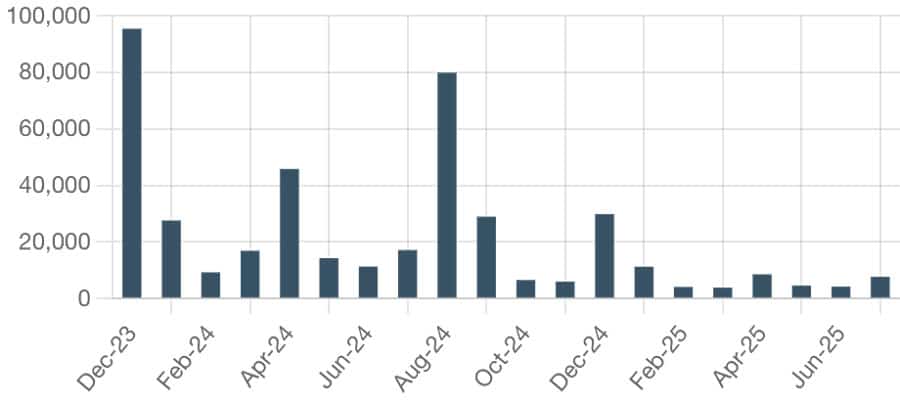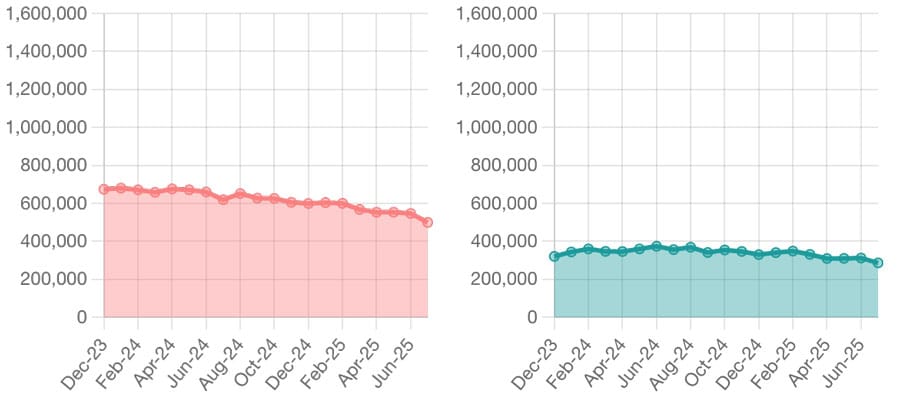Canada: Study permit numbers are in steep decline in 2025
- Overall study permit application volumes are down roughly -50% in the first half of 2025 compared to the same period last year
- Approval rates for new study permit applications have fallen to 30% through June 2025, compared to 51% for the same period in 2024
- The number of new study permits issued through June 2025 is trending well below IRCC’s cap limits for the year
- Indeed, it is entirely likely that the total number of permits issued this year will fall considerably below the cap target
- The number of new students arriving in Canada in the first seven months of 2025 has declined by -69% compared to the same period last year
- The number of study permit holders in Canada has dropped from 1,023,785 in January 2024 to 785,830 as of July 2025 (a -23% decline overall)
In 2024, the first year under Canada's current cap on new international student enrolments, the total number of new study permits issued was 267,890 – a roughly -48% reduction from 2023 levels and nearly 100,000 study permits below the official IRCC target for the year.
There is every indication that that pattern is continuing, and indeed worsening, through the first seven months of 2025. The year has been marked by a steady stream of reports from agents and students of extended processing times, and that more study permit applications are being declined this year.
As we noted recently, both processing times and approval rates vary from market to market and by level of study, but the overarching observation is of a study permit system that is hindered by processing capacity and by a more restrictive approach to assessing study permit applications.
In the first two quarters of 2024, IRCC processed 290,635 new study permit applications, or just over half of the total number of applications received for that year.
The IRCC data for year-to-date 2025, however, indicates that only 143,485 new study permit applications were processed between January and June of this year. That represents a roughly -50% decline in overall application volumes over the first two quarters of 2025.
Those numbers, however, include both applications from new students as well as renewals for continuing students already in Canada, which has the effect of both obscuring the number of new arrivals as well as the approval rate for new applicants (given that renewals are approved at much higher rates).
If we look just at applications for new students, the situation is even more concerning. Data from Immigration, Refugees and Citizenship Canada (IRCC) reveals that the department processed only 104,980 study permit applications between January and June 2025. Of those, only 31,580 were approved (an approval rate of just over 30%).
This compares to the 223,551 new study permit applications processed during the same period in 2024. Of those, 113,368 were approved, which works out to a 51% approval rate.
Let's pause on those numbers for a minute.
What they are telling us, quite unequivocally, is that:
- The volume of study permit applications to Canada has essentially been reduced by more than half year-over-year (bearing in mind as well that that follows on from 2024 when the number of permits fell by -48% from 2023 levels)
- The approval rate for new study permit applications has dropped from 51% last year to 30% this year
- The number of new study permits issued for the first half of the year is well below IRCC's cap limits for 2025
To expand on that last point, the IRCC cap structure projects the number of study permits issued to new students for 2025 at 316,276. At the current trajectory of study permit issuance, the actual number of study permits issued in 2025 is on pace to fall well short of that target.
"Perhaps the most concerning and striking data point is the overall volume of applications processed and approved," says Jonathan Sherman, head of sales and partnerships at immigration platform BorderPass. "Just 31,580 new study permits were approved in the first half of 2025. IRCC’s published target for the year is just over 300,000, which means at the current pace we will only reach around 20%-30% of the goal unless there is a dramatic shift.”
As noted above, the number of permits issued in 2024 fell nearly 100,000 below the cap limit for that year. Based on the volumes we are seeing in the first half of this year (and again barring a significant change in study permit processing over the balance of the year), it is entirely possible that the total volume for the year could lead to a shortfall against the cap of more than 200,000 students.
Who has arrived so far?
Another way to observe the dramatic shift in processing volumes and study permit issuance this year is in the number of new students actually arriving in Canada.
The following chart from IRCC tracks this indicator from December 2023 through July 2025, and it describes a -68.97% decrease in student arrivals in the first seven months of 2025 compared to the same period last year.
In the first seven months of 2024, 142,175 new international student arrived in Canada. Between January and July this year, only 44,105 new students arrived.

A declining stock of students in-country
That outlook for 2025 comes on the heels of a steady decrease in study permit holders in Canada since January 2024.
The following graphs show the number of people in Canada with an active study permit (left) and those in Canada holding both a study permit and a work permit (right). And what the two charts describe is a substantial decline in student numbers over the last 18 months.

During the period from January 2024 through July 2025, the number of people in Canada with a study permit declined from 679,820 to 499,365 (a decrease of -26.54% overall). Over that same period, the number of people in Canada holding both a study permit and work permit fell from 343,965 to 286,465 (-16.71%).
Taking both categories together, the number of study permit holders in Canada has dropped from 1,023,785 in January 2024 to 785,830 as of July 2025 (a -23.23% decline overall).
It will be months yet before we know the full impact of Canada's current policy settings on international student numbers for 2025. But the indicators we have in hand make it clear that Canada's stock of international students is eroding at an alarming rate, and at a pace that all stakeholders and policy makers in the country will want to reflect on urgently.
For additional background, please see:
















